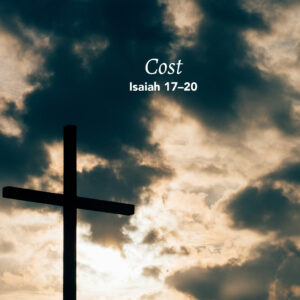Isaiah 17-20: Cost
September 7, 2024
TODAY'S BIBLE READING:
Isaiah 17-20, Proverbs 21:17-31, Luke 22:14-23, Hebrews 4:12-16

Four chapters of extraordinary content, and great depth—who is equal to comment on these things, even in devotional form, in a few short words!
In chapter 17 there is judgment against Damascus. They had “forgotten the God of your salvation, and have not remembered the Rock of your refuge” (17:10). There is some hope for there will be a “day” when “man will look to his Maker, and his eyes will look on the Holy One of Israel” (17:7).
Chapter 18 has a message for Cush, a message which sends people flowing to Mount Zion, to God, and to salvation.
Then in chapter 19 there is judgment against Egypt. And then chapter 20! “As my servant Isaiah has walked naked and barefoot for three years as a sign and a portent against Egypt and Cush…” so shall the Egyptian captives and the Cushite exiles be “naked and barefoot, with buttocks uncovered” (20:3-4). Being a prophet was certainly not for wimps. Isaiah was called to dramatically enact what would take place to those on God’s judgment.
What can we learn from these chapters? Four thoughts come to mind.
1. We can learn that God is a God of judgment. We are not to trivialize God or make God the kind of “god” who winks at sin and who either does not care about evil or is too impotent to do anything about it.
2. We can learn that God’s prophets/preachers/Bible teachers/evangelists are not only to preach “positive” messages but also at times to warn. There is a time for a message of judgment. Why is it that we so seldom hear such messages today? Many reasons might be advanced. At least one is that we have so few models of it being done well. When we think of “hellfire” sermons, we think of angry, manipulative, and unattractive ways of going about it. We have never heard a George Whitefield preach hell with tears in his eyes. May God give us grace to be able to warn with love.
3. A critical component of restoring health to a people, or an individual, is re-orientating our lives around the God who is, and not around any particular manifestations of “idols” that may be in our lives. This idol worship was the great sin behind the sins of Israel at this stage, and it is often the case with us, too. Why do we sin the way we sin? It may well be that we are treating some objective or desire or ultimate as more important than God, and therefore we act out in certain particular patterns. What is the idol that gives power to the sin with which we struggle? Kill the idol; kill the sin.
4. And perhaps most strangely—what do we make of naked Isaiah (20:1-4)? Let us at least acknowledge that it is unique, and not to be thoughtlessly copied, and was a special word to Isaiah for a special reason. But let us also acknowledge that at the same time it does represent a principle. J. Oswald Sanders, I think it was, once wrote that we need to relearn that a great work for Christ can only be done at great cost. That cost for you may well not be—almost certainly will not be!—preaching naked! But there will be a cost. We preach the cross, we follow the crucified one, and to do evangelism, to train our children, to be a faithful husband or wife, can only come at real cost to our selfishness. It hurts sometimes. But it’s worth it.
ABOUT THE AUTHOR
Josh Moody (Ph.D., University of Cambridge) is the senior pastor of College Church in Wheaton, IL., president and founder of God Centered Life Ministries, and author of several books including How the Bible Can Change Your Life and John 1-12 For You.
WANT MORE?
To receive God Centered Life devotionals directly in your inbox, as well as other resources, enter your email address in the form at the bottom of this page and click "subscribe."

